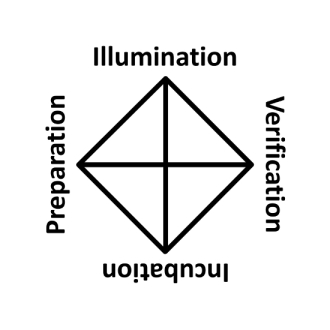 While searching for something else I chanced upon “The Four Elements of Thinking: Reasoning, Creativity, Synthesis, Evaluation” by Benjamin Cheung, Ph.D., published in 2019. Any book about the four classical elements being used as metaphors for other things is of personal interest, plus that the things being four aspects of thinking was immediately intriguing. Dr. Cheung divides thinking into the four aspects of the subtitle, plus he divides each aspect into four sub-aspects or skills as follows:
While searching for something else I chanced upon “The Four Elements of Thinking: Reasoning, Creativity, Synthesis, Evaluation” by Benjamin Cheung, Ph.D., published in 2019. Any book about the four classical elements being used as metaphors for other things is of personal interest, plus that the things being four aspects of thinking was immediately intriguing. Dr. Cheung divides thinking into the four aspects of the subtitle, plus he divides each aspect into four sub-aspects or skills as follows:
-
- Reasoning (Earth Thinking)
- Evidence
- Inductive Reasoning
- Deductive Reasoning
- Abductive Reasoning
- Creativity (Air Thinking)
- Investigation
- Incubation
- Insight
- Innovation
- Synthesis (Water Thinking)
- Linking
- Perspective
- Synthesis
- Pivots
- Evaluation (Fire Thinking)
- Decisions
- Judgments
- Contingency Plans
- Validation
- Reasoning (Earth Thinking)
 Note his choice in assignment of the Classical Four Elements to each of these aspects of thinking. I would have assigned them differently: Reasoning to Fire, Creativity to Earth, Synthesis to Air, and Evaluation to Water. The price of the e-book is reasonable, so I may investigate the “thinking” behind his alignments by purchasing and reading further.
Note his choice in assignment of the Classical Four Elements to each of these aspects of thinking. I would have assigned them differently: Reasoning to Fire, Creativity to Earth, Synthesis to Air, and Evaluation to Water. The price of the e-book is reasonable, so I may investigate the “thinking” behind his alignments by purchasing and reading further.
He also has an interesting book on collections of ideas which he arranges into a “periodic table,” which might be analogous to a more modern scientific elemental assignment. Additionally, he has had Kickstarters on playing or flash cards for both books, which is a notion somewhat dear to my heart (See A Game of Fourfolds).
I have mentioned thinking or thought often in this blog, and believe that poor thinking or irrational thinking is greatly to blame for many of our current ills. Blame can also be attributed to poor communication skills. The best thinking can be obscured by poor communication. What is the best theory of the linkage between thought and language?
Further Reading:
Benjamin Cheung, Ph. D. / The Four Elements of Thinking: Reasoning, Creativity, Synthesis, Evaluation
https://en.wikipedia.org/wiki/Language_and_thought
[*13.1]


